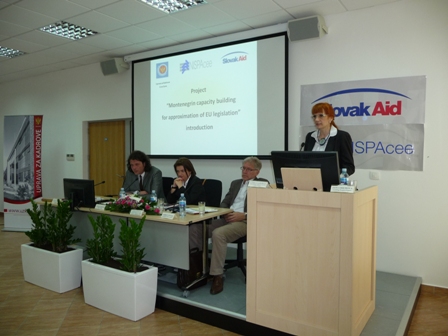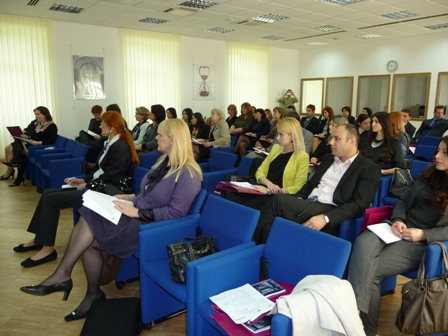| Newsletter / |
|
Montenegrin Capacity Building for Approximation of EU legislation Supported by: SlovakAid, a Slovak Ministry of Foreign Affairs' Programme
Conference "Montenegrin Capacity Building for Approximation of EU legislation” Date: April 23, 2013 Venue: Danilovgrad, Montenegro The conference, "Montenegrin Capacity Building for Approximation of EU legislation” was held at the ReSPA offices in Danilovgrad, Montenegro, on April 23, 2013. The conference was organised within the joint project of NISPAceeand HRMA (Human Resources Management Authority), Montenegro. The project is supported by SlovakAid, a Slovak Ministry of Foreign Affairs' Programme. More than 50 participants attended the conference. The majority represented various Montenegrin central state institutions, responsible for preparing Montenegro for EU integration. The conference was opened by Ms. Svetlana Vukovic, Director of Human Resources Management Authority, Mr. Mirko Vintar, NISPAcee President, Ms. Snezana Radovic, Ministry of Foreign Affairs and European Integration andMr. Zvezdan Čadjenović, Project Expert. In the first part, the Slovak project experts Ms. Jana Oremova andMs. Ludmila Gajdosova introduced the project "Montenegrin Capacity Building for Approximation of EU legislation” and the Montenegrin expert Mr. Zvezdan Cadjenovic spoke about the Challenges facing Montenegro in the EU integration process and approximation of EU legislation from a project perspective. Following this, the Slovak legal experts, Ms. Jana Oremova, Mr. Boris Balog and Ms. Monika Michalova presented the developed individual policy papers, divided into 4 thematic areas: Central state administration and its division of competencies within the European integration process ·National Parliament - its organisational structure and competencies within the European Union during the accession period. ·Governmental Office - its organisational structure and competencies within the European Union during the accession period. ·Special central state body for controlling the level of implementation of national law with the acquis – its structure and competencies. ·Ministry of Foreign Affairs - its organisational structure and competencies within the European Union during the accession period. ·Constitutional Court and its competencies within the European Union. Constitutional law changes required for ensuring the Euro integration process as well as membership of the European Union ·National constitution and its changes within the European Union. ·The main relationship between the Government and Parliament within the European Union. ·Approximation´s governmental decrees as a special source of law for implementation of the acquis. Selected aspects of the acquis communautaire implementation from the point of view of its methods and forms ·Preparation of the national implementation programmes relating to the European Union. ·The Statement of Compatibility and Tables of Concordances – possibilities of how to ensure the compatibility of the legal sources within the European Union. Other actual themes connected to the European integration process ·Regulatory impact assessment. ·Motivation of state employees during the accession period. In the framework of the conference, participants had the opportunity to ask the project experts about and discuss with them, the issues of interest to them. In addition, after each thematic area, time was allotted for discussion with the participants.   |